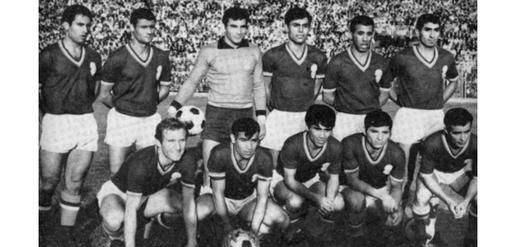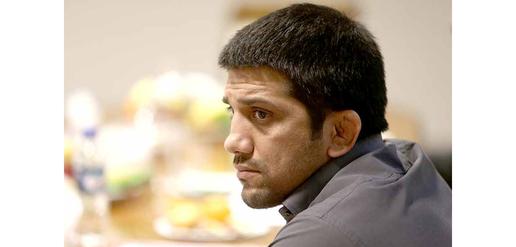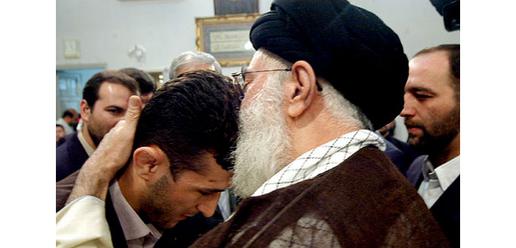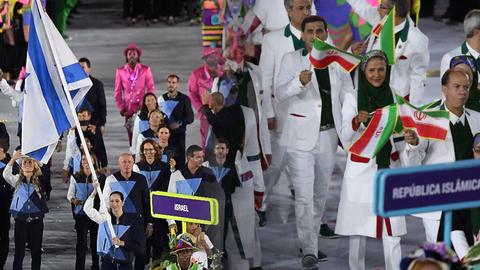The following article was written by an Iranian citizen journalist on the ground inside the country, who writes under a pseudonym to protect his identity.
Ayatollah Ali Khamenei seldom talks about sports. But when he does, Iranians always remember what he says.
“I watched the game,” Khamenei said after the historic match between Iran and the United States at the 1998 FIFA World Cup in France. [Persian Link]. “To be honest, that night I did not want to watch because it was late and was time for me to go to sleep, but as I was sitting I turned on the TV and suddenly saw the goal [by Hamid Estili]. I was no longer sleepy and sat and watched the game until the end.” (Iran won the match 2-1.)
In 1983, when Khamenei was president, he also commented on a historic match between Iranian and Israeli football teams during the Shah’s time.
The match, the final of the Asian Cup, took place on May 19, 1968 at the 30,000-seat Amjadieh (now Shahid Shiroudi) Stadium in Tehran. It was the first time Iran had competed in the Asian Cup and Israel was the defending champion. Iranian football fans were nervous and conspiracy theories abounded before the match. One was that Habib Elghanian, a wealthy Jewish businessman and the owner of the landmark Plasco Building that recently burned down, had purchased all the tickets to prevent people from going to the stadium. Then it was rumored that he had purchased half of all the tickets to give them to Jews for free. But on the day of the match, the stadium overflowed with spectators, all loudly cheering the Iranian team.
A Peculiar Logic
Iran won the final 2-1, made all the more historic because it was the first time it had competed in the Asian championship. The two goals were scored by Homayoon Behzadi and Parviz Ghelichkhani. Ghelichkhani now lives in Paris and cannot return to Iran due to his political views. After the 1968 victory, Iran erupted in celebrations. Khamenei called the demonstrations of jubilation an instance of “fighting Israel.” In 1983, he recalled the match. “In those days, I was a young seminary student,” he said. [Persian Link] “The general mood in Tehran was against the Israeli team. After the game all the people of Tehran showed their joy for this victory. The taxi driver said ‘Did you see how we scored?’ This showed that the Iranian people were unhappy about the Shah’s cooperation with Israel.”
Based on this peculiar logic, if somebody on the streets of Tehran asked you today,“did you see how we scored against Iraq?” it would mean that people are unhappy about Iran’s cooperation with Iraq. The same would be true of matches against Germany or Brazil.
The perception is that after the 1979 Islamic Revolution, all sports between Iranian and Israeli athletes came to an end, but this is not true. In 1983, the FILA World Wrestling Championships were held in Kiev, which was part of the Soviet Union in those days. Iranian and Israeli wrestlers came face to face. The Iranian Greco-Roman wrestler Bijan Seifkhani went to the mat against Robinson Konashvili from Israel in the 74-kilo category and won 7-4.
After this victory, Seifkhani was ninth in the world. The newspaper Kayhan and its sports supplement published articles celebrating the success and praising him as a great champion because he had defeated an Israeli athlete. Kayhan’s editors seemed unaware that this would mark the end of the era when Iranian athletes could compete against Israeli athletes.
Defending The Palestinian People
Immediately after the news of Seifkhani’s victory, the then-Foreign Minister Ali Akbar Velayati ordered the Iranian team to return to Iran immediately. Iranian wrestlers received the order late at night. The coaches went room to room, woke up the wrestlers one by one and told them to pack because they had to return to Tehran. And when they arrived back, all members of team, athletes and non-athletes alike, and especially Seifzadeh, were severely reprimanded.
Then the Iranian government made a categorical announcement: No Iranian athlete was to compete against “Zionists” under any condition, whether in official competitions or unofficially. The justification was that Iran did not recognize Israel as a state and it was defending the Palestinian people. But what’s interesting here is that, although Palestinians have persistently tried to oust Israel from FIFA, when the Palestinian Football Team participated in the Asian Cup games for the first time in 2015, five of its footballers were Israeli Arabs. After this news emerged, it took the Iranian Intelligence Ministry less than 12 hours to ban domestic media from reporting on it in any way.
Not Even Photographs
But Iranian athletes are not only banned from competing with Israeli athletes, they face reprimands or fines even if they stand next to one. For instance, during the 2016 World Cup shooting competitions in Baku, Azerbaijan, which saw the teams of 80 countries participating, Iranian athlete Hossein Bagheri won a silver in the Men’s 10m Air Rifle, the first Iranian medal in the competitions. But when a photograph of him standing next to the Israeli bronze medalist Sergey Richter was published, the Young Journalists Club, part of Islamic Republic of Iran Broadcasting (IRIB) referred to it as “a medal that smells of blood.” On his return to Iran, not only did Bagheri receive no thanks, he was summoned for questioning about why he had appeared next to an Israeli.
The ban went unchallenged throughout the 1980s and 1990s. Iranian officials proudly proclaimed that Iranian athletes would not compete against Israelis. But this “golden age” came to end when the International Olympics Committee (IOC) updated the Olympic charter, making it clear that if an athlete refused to compete against other athletes on political, religious, racial or ethnic grounds, that athlete would be banned from international competitions. Furthermore, the federation or the Olympics committee of that country would be fined and/or would be banned from competitions.
The last Iranian athlete to refuse to compete against his Israeli opponent was the judo athlete Arash Mir-Esmaili during the 2004 Athens Olympics. He was considered the greatest chance for Iran to win a medal, and at the opening ceremonies it was he who carried the Iranian flag. In the first lottery, Mir-Esmaili was matched against Ehud Vaks from Israel. He knew that he could not compete against him and disqualified himself by claiming he was overweight. But the Iranian media had no qualms about telling the truth. A spokeswoman for the Iranian National Olympic Committee in Tehran said Iran's flag-bearer had been instructed not to compete, according to The Guardian. "This is a general policy of our country to refrain from competing against athletes of the Zionist regime and Arash Mir-Esmaili has observed this policy," she said. And Mir-Esmaili himself was quoted by Iran's official news agency as saying he refused to compete out of sympathy with the Palestinian people.
Awarded For Cowardice
On his return to Iran, the then-Speaker of parliament, Gholamali Haddad, and a group of MPs welcomed Mir-Esmaili at the airport. And Ayatollah Khamenei decided to comment. “They made a lot of noise [about Mir-Esmaili’s refusal] so that it would be condemned, but this devout young Iranian outsmarted them with a fait accompli,” he said to a group of Iranian athletes afterwards. President Mohammad Khatami awarded Mir-Esmaili a cash prize the equivalent of $125,000 and Tehran’s mayor Mohammad Bagher Ghalibaf named a building complex in Tehran after the athlete to thank him for “supporting the Palestinian people.”
In the 2011 Greco-Roman Wrestling World Championship in Istanbul, the heavyweight Bashir Babajanzadeh beat his Russian opponent in the first round. But he withdrew in the second round, giving injury as an excuse, despite the fact he was ahead 3-1. Had he stayed and won the second round he would have had to fight an Israeli challenger in the semi-finals.
In 2004, Vahid Hashemian, a footballer for the Iranian National Team who played for Germany’s Bayern Munich, refused to play for Bayern against Maccabi Tel Aviv Football Club, using injury as an excuse. Ashkan Dejagah used the same excuse in 2008 when he was part of the German National Youth Football Team. On the day the team was scheduled to play against its Israeli counterpart he claimed that he had been injured.
The Germans quietly punished both players. Hashemian’s contract was not renewed. Ashkan Dejagah was not promoted to the German National Football team and he returned to the Iranian national team. At the time, the then-German Interior Minister Wolfgang Schäuble criticized Dejagah. If someone plays for the national team, he said, then he cannot say that he will play against one country and not the other for political reasons.
The next year, Mohammad Ali Karimi included a clause in his contract with Bayern Munich that relieved him of having to play if the opposing team in a match was from Israel. The same clause has been included in contracts for Sardar Azmoun with the Russian team Rostov, Alireza Jahanbakhsh with the Dutch team Alkmaar, Saeed Ezatolahi Afagh with Rostov, and Ashkan Dejagah, who now plays for the German club Wolfsburg.
We Will Show You “Why Not”!
Iranian authorities came down hardest on Iranian basketball stars Hamed Haddadi and Samad Nikkhah Bahrami. In November 2009, the (now defunct) sports website FanHouse published an audio clip of Haddadi in which he was asked whether he would shake hands with an Israeli player for the US basketball team Sacramento Kings. “Yes, why not?” he was heard to answer. “What’s the number on his jersey?”
A little earlier, at the 2008 Summer Olympics in Beijing, Samad Nikkhah Bahrami and other Iranian players shook hands with David Michael Blatt, the Israeli-American head coach of the Russian National Basketball team. When pressed by reporters in a press conference after the game to explain the incident he answered, “we are here to play and nothing else.”
Both athletes were summoned by the Security at Iranian Physical Education Organization to explain themselves and both were later removed from the national basketball team despite negative reactions from the Iranian media.
So “injury” has replaced “defending the rights of the Palestinian people” as the excuse for not competing against Israeli athletes because the International Olympics Committee will punish any country or athlete that refuses to compete with an individual or a team from a particular country on political, religious, ethnic or racial grounds.
But sometimes it doesn’t work. For example, in the 2013 FILA Wrestling World Championships in Budapest, Mohammad Talaei, the head coach of Iran’s freestyle wrestling team, presented medical certificates for two young wrestlers who were to face Israeli opponents. This met with the response: “The medical committee of the competitions said that the third person would be accepted as injured only if his hand is cut off.”
Then there is the interesting case of freestyle wrestler Alireza Dabir, who is now a principlist member of Tehran’s City Council and a close ally of Tehran’s mayor, Mohammad Bagher Ghalibaf. He holds a gold medal from the 2000 Olympics in Sydney. “If the lottery pits me against an Israeli I am not going to remove myself,” he told Mehr Alizadeh, head of the Physical Education Organization, as he was to depart for the 2004 Athens Olympics. This scared Iranian sports officials but as it happened he lost two consecutive matches to his Russian and Uzbek opponents and was eliminated from the Olympics early on.
Cheating At Lottery
At one point Dabir also tried to game the system. At the 2003 international competitions in New York, the wrestlers were allowed to draw their own lotteries. Dabir pulled out two names so that if one was an Israeli he could drop it and show the second one. It just happened that one of the names was that of an Israeli wrestler. He dropped back the name and kept the second one, a Bulgarian athlete. But he was found out and the international wrestling federation ordered the athletes to draw only one name.
Iranian athletes in almost any sport, even goalball, kabaddi, track and field, swimming or shooting, have suffered consequences from refusing to compete against Israeli athletes. Now that the qualifying games for the 2018 FIFA World Cup are underway one question arises: If Iran has to face Israel at the cup would all Iranian footballers be able to provide medical certificates to claim “injuries”?
In the end, it is Iranian athletes who have lost out by not competing against the Israelis. Arash Mir-Esmaili was an exception. Others have sometimes received a passing nod of appreciation from Iranian officials and sometimes not. What is important for the Islamic Republic is that Iran is the record-holder in refusing to compete against Israeli athletes. Who cares if the Palestinian National Football Team itself had no problem with relying on Israeli footballers?
Shahriar Nekoozad, Citizen Journalist
visit the accountability section
In this section of Iran Wire, you can contact the officials and launch your campaign for various problems




























comments